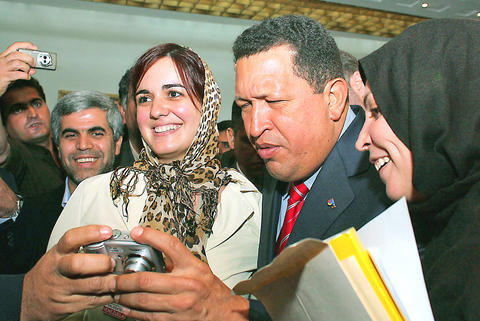Venezuelan President Hugo Chavez arrived in Tehran late on Saturday for the third time during the presidency of Mahmoud Ahmadinejad, a fellow fiery critic of the US, Iranian television reported.
Chavez, accompanied by his foreign, communication, energy, industry and economy ministers, was met at the airport by Iranian Industries Minister Ali-Reza Tahmasbi, the television said.
During the two-day visit, the last leg of a tour that has taken Chavez to Russia and Belarus -- both recently at loggerheads with the US -- he will hold talks with top Iranian officials and discuss bilateral, international and regional issues, Iranian media said.

PHOTO: AFP
Iran is OPEC's fourth-largest crude producer while Venezuela is also a major player in the cartel, and the two countries enjoy warm ties in the energy sector.
During the visit, the countries are expected to sign a number of agreements including for the construction of 7,000 houses, a petrochemical plant and a vocational training center in Venezuela.
Venezuelan Ambassador to Tehran Arturo Anibal Gallegos Ramiraz told the official IRNA news agency that Chavez's visit was "aimed at bolstering mutual cooperation in economic, industrial and political fields."
"Iran and Venezuela through exchange of visits can prove that their relations are at the best possible level," he said.
Chavez is the most vocal cheerleader in Latin America for Iran and its nuclear program, which is feared by the West to be a cover for weapons development.
The trip comes at a time when Iran is threatened with toughened UN Security Council sanctions for its continued refusal to freeze controversial nuclear work.
The US, which broke diplomatic ties with Iran in 1979, has been spearheading the international campaign to stop Iran's enrichment program and it has never ruled out ruled out a military option to halt the drive.
Chavez is expected to visit the land-based facilities of Iran's South Pars gas field in Asaluyeh off the Gulf coast and speak at Tehran's Science and Industry University, where Ahmadinejad used to teach before being elected president in 2005.
Ahmadinejad toured Latin America in January in a bid to seek support from the region's leftist leaders who share his scornful defiance of the US.
Venezuela and several other Latin American countries are members of the Non-Aligned Movement that at a summit last year emphatically backed Iran's right to nuclear energy.
As Iran's No. 1 ally, Venezuela was alone in September 2005 in opposing a resolution at the International Atomic Energy Agency that found Iran in violation of nuclear safeguards, paving the way for its referral to the Security Council.
During his latest trip, which kicked off on Wednesday, Chavez met with Russian President Vladimir Putin and Belarus counterpart Alexander Lukashenko and urged a global revolution against Washington.
He has also discussed possible purchases of submarines and other defense equipment from Russia, arguing that these are needed to defend his oil-rich country against the US.

The latest batch from convicted sex offender Jeffrey Epstein’s e-mails illustrates the extraordinary scope of his contacts with powerful people, ranging from a top Trump adviser to Britain’s ex-prince Andrew. The US House of Representatives is expected to vote this week on trying to force release of evidence gathered on Epstein by law enforcement over the years — including the identities of the men suspected of participating in his alleged sex trafficking ring. However, a slew of e-mails released this week have already opened new windows to the extent of Epstein’s network. These include multiple references to US President Donald

CHARGES: The former president, who maintains his innocence, was sentenced to 27 years and three months in prison for a failed coup bid, as well as an assassination plot Far-right former Brazilian president Jair Bolsonaro is running out of options to avoid prison, after judges on Friday rejected his appeal against a 27-year sentence for a botched coup bid. Bolsonaro lost the 2022 elections and was convicted in September for his efforts to prevent Brazlian President Luiz Inacio Lula da Silva from taking power after the polls. Prosecutors said the scheme — which included plans to assassinate Lula and a top Brazilian Supreme Court judge — failed only due to a lack of support from military top brass. A panel of Supreme Court judges weighing Bolsonaro’s appeal all voted to uphold

Chinese tech giant Alibaba yesterday denied it helps Beijing target the US, saying that a recent news report was “completely false.” The Financial Times yesterday reported that Alibaba “provides tech support for Chinese military ‘operations’ against [US] targets,” a White House memo provided to the newspaper showed. Alibaba hands customer data, including “IP addresses, WiFi information and payment records,” to Chinese authorities and the Chinese People’s Liberation Army, the report cited the memo as saying. The Financial Times said it could not independently verify the claims, adding that the White House believes the actions threaten US security. An Alibaba Group spokesperson said “the assertions

LEFT AND RIGHT: Battling anti-incumbent, anticommunist sentiment, Jeanette Jara had a precarious lead over far-right Jose Antonio Kast as they look to the Dec. 14 run Leftist candidate Jeannette Jara and far-right leader Jose Antonio Kast are to go head-to-head in Chile’s presidential runoff after topping Sunday’s first round of voting in an election dominated by fears of violent crime. With 99 percent of the results counted, Jara, a 51-year-old communist running on behalf of an eight-party coalition, won 26.85 percent, compared with 23.93 percent for Kast, the Servel electoral service said. The election was dominated by deep concern over a surge in murders, kidnappings and extortion widely blamed on foreign crime gangs. Kast, 59, has vowed to build walls, fences and trenches along Chile’s border with Bolivia to